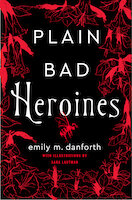Review: Empire of the Vampire
/3 stars. Hmmmmmmm.
First of all - wow, I'm surprised this book hasn't gone totally viral on TikTok, because it is a MOOD, a VIBE, and an AESTHETIC all rolled into one. This is going to sound like a very weird observation, but I think this story would've been better as ....... a video game. The quest/D&D vibes, the visuals, the delightful side characters all sort of give off a game flavor, or something. It's also incredibly long, and it requires an active eye and an active brain because there are many details in this world that for whatever reason would not stick for me. Certain names, for example, and aspects of the conflict (the bloodlines, the various rulers, etc.). The sheer amount of scrolling back I did was unprecedented. But I stuck with it. I couldn't resist.
And yet... sigh. It was okay. A couple of things just weren't to my preference, like the non-chronological narrative. I prefer, like the protagonist's captor, for stories to be told in order. And a lot of the exposition was only thinly veiled by the aforementioned captor's requests that our narrator "explain things to him as though talking to a child." AKA, for the reader. Real subtle, there. I also tend to be a bit quick to reject stories that involve, like, the one true epic love (unless I'm reading romance, of course). This bothered me in The Name of the Wind, which is a clear and blatant influence on Empire of the Vampire.
Speaking of influences: there's so much. From Stephen King (if a character hovers at a window and says "let me in," my brain is going straight to 'Salem's Lot) to LOTR (SO MUCH LOTR... the ringbearer-I-mean-Dior should decide, the "no man can kill me" thing, references to riddle games, so much more) to HP (nice to visit the forbidden section of a library again) to the Witcher books to ASOIAF to True Blood to The Da Vinci Code to even like...the Southern Reach Trilogy and The Name of the Rose by Umberto Eco (plus the more overt ones like Anne Rice's Vampire Chronicles), I could detect references and borrowed elements around every corner. It's kind of fun, actually. This book knows its ancestors and pays tribute accordingly, if not a little obviously.
I will say: it took an incredibly talented, smart, dedicated, rock star of a writer to craft this story. Next to other high fantasies, the worldbuilding is there. The tropes are there, applied adorably and with delight. But where the writing is very beautiful and the the themes compelling, there's something a little ... immature about this book. One reviewer stated that the characters seem like "caricatures designed for specific fandoms," and I could not agree more. Listen, Mr. Kristoff is a very famous, successful author with a passionate following, and I wouldn't blame if he... used what he's figured out works, if that makes sense.
I've heard other reviewers call this book out for male posturing, or criticize the swearing/bawdy humor. Maybe that's part of what I felt was immature, although typically I don't find that sort of thing offensive or bothersome (although a couple of the period jokes made me pause). I would also say that perhaps there are some pacing issues. Perhaps with plotting, as well. Again, the flashback-flashforward storytelling device is NOT my favorite, but in this case I think I can objectively say it weakened the flow a bit.
I don't know if I'll read the next one. To be honest, I spent a lot of this book miserable alongside the characters. There are victories, to be sure, and warm moments, I suppose, but the story in this book primarily involves loss - or the anticipation of loss. The dread of loss. Loss of innocence, faith, love, loved ones. Things going wrong, over and over and over again. I don't know if I'd want to put myself through that again. Oh, and trigger warning: animal death. I'd dock a star for that regardless.
I have the utmost respect for Jay Kristoff and his success is well-deserved. He's such a talented writer and I love that people love this book. I'm just not one of them, today.
The illustrations get 5 stars.
Empire of the Vampire on: Amazon | Bookshop.org | Goodreads










